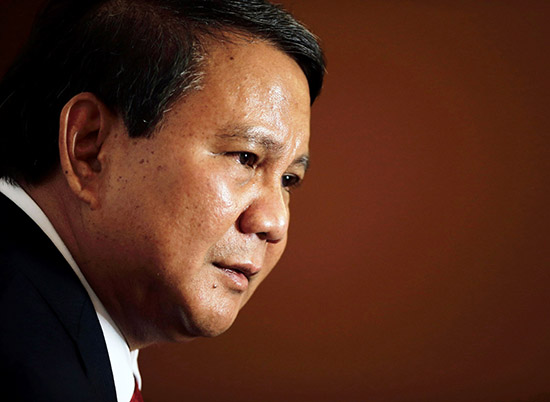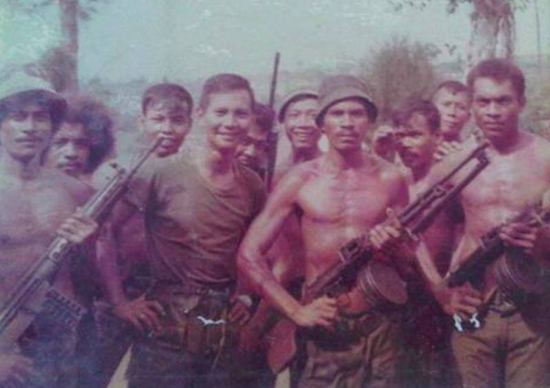
So far, the Indonesian presidential election campaign appears to have received surprisingly little attention in now independent Timor-Leste. Maj Nygaard Christensen and Angie Bexley analyse former general Prabowo Subianto’s questionable human rights record as one of the candidates.
ANALYSIS: In December 2013, in a letter to the editor of The Jakarta Post, Indonesian presidential candidate Prabowo Subianto attempted to set the record straight.
His letter was written in response to Aboeprijadii Santoso’s article, ‘Whatever happened in Kraras, Timor-Leste, Pak Prabowo?’ In the article, Santoso asks Prabowo about allegations during his tour of duty in then Indonesian East Timor.
Prabowo has been implicated in the death of Timorese independence leader Nicolau dos Reis Lobato in December 1978. He’s also connected to the 1983 massacre in Kraras, known as the village of widows, which left an estimated 300 people killed by Indonesian troops.
Prabowo declares the claims a “personal attack on my military career and personal reputation, based on unproven allegations, innuendos and third-hand reports”. His letter is the continuation of reports in Indonesian media, where such human rights violations are systematically downplayed, or denied entirely.
So far, the Indonesian presidential elections appear to have received surprisingly little attention in now independent Timor-Leste.
Activists and human rights NGOs continue to call attention to Prabowo’s questionable human rights record in both Indonesia and Timor-Leste. But with his association with killings and torture in Timor, one would expect reactions of outrage over his leading role in the Indonesian presidential elections, or at least some degree of general public interest.
Not so.
Several reasons
Why don’t ordinary Timorese seem to care that Prabowo might be their neighbour’s next president? There are a number of reasons.
Firstly, it must be made clear that Timorese silence surrounding Prabowo’s bid for presidency should not be mistaken as either proof of innocence or general public forgiveness in Timor-Leste towards Indonesian army leaders. In fact, Timorese will often say that “we have no problem with the Indonesian people, our problem is with the military; the Indonesian people have also been victims”.
Secondly, the political challenges that the new nation faces are all consuming. While cries for justice are still front and centre of public debate, past Indonesian human rights violations are no longer at the centre of this commentary. Instead, they feed into a broader narrative of injustice, implicating not just Indonesia, but Australia, and the domestic political leadership.
Agitators and reformers in Timor-Leste’s activist community have taken their fight for justice to contemporary issues that relate directly to Timor’s sovereignty. For example, Australia’s grab for oil in the Timor Sea has motivated multiple demonstrations against what is viewed as an unlawful appropriation of Timor-Leste’s petroleum resources.
A current graffiti text painted on a wall near the Australian Embassy in Dili writes, “Our blood runs from the mountains to the sea”. The text is a poetic statement of ownership of the petroleum resources, but also invokes the history of human loss under Indonesian occupation, and the resistance struggle waged from the Timorese mountains.
Thirdly, Timor’s sluggish response to the Indonesian elections and the Prabowo candidacy also owes to the repeated inability of judicial procedures – such as the Serious Crimes Unit or transitional justice initiatives – to hold Indonesian citizens responsible for human rights violations.
The perpetrators of these crimes will likely never be brought to justice, a sentiment backed by Indonesia’s political elite’s unwillingness to participate in justice processes.
Unjust justice
“Justice is only for the little people” the refrain goes in Timor-Leste – meaning that only ordinary people are taken to court for minor offenses, while “the big people” roam free, regardless of the scale of their crimes.
The general silence surrounding Prabowo’s violent past – in both Indonesia and Timor-Leste – leaves him and his team of ultra slick PR supporters relatively free to reinvent his identity outside of his alleged human-rights abuser profile.
On his Facebook profile, photographs of a young Prabowo in military uniform in then Indonesian East Timor are manipulated to create a profile of a heroic, strong, and self-sacrificing leader.
Moreover, Indonesian media routinely write-off critiques of Prabowo’s problematic human rights record as a “smear campaign”. More disturbingly, some have even argued that the Timorese remember Prabowo as a hero.
Prabowo himself has tried to capitalise on such claims. Referring to “friendly meetings” with Timorese political leaders over the past years, Prabowo asks if he is indeed guilty, why then have former Timorese leaders happily posed for photos with him?
This, in fact, is a good question.
Burdened by realpolitik, the Timorese political elite have generally opted for a reconciliatory stance to relations with Indonesia. In 2004, Xanana and former Indonesian army General Wiranto, accused of human rights violations in connection with Indonesia’s 1999 withdrawal from Timor-Leste, even embraced.
Direct contradiction
This is in direct contradiction with Xanana’s speeches and writings during the resistance, which were often replayed by ordinary people to guide and inform their thinking.
In them, Xanana agonises over the injustices done to the Timorese people under Indonesian occupation and pledges a personal quest to taking the people responsible to court after independence. This appealed to most people’s sense of retribution for the suffering they and their families had endured.
After independence, Xanana’s speeches took a different tact, and signaled a changing orientation of his own concept of “justice”. In his public addresses from 2002 onwards, Xanana Gusmão made clear that he preferred to prioritise reconciliation that privileged diplomatic ties with Indonesia.
In a speech to the National Parliament in October 2002, Gusmão drew on the indigenous concept of badame, a Tetun word for “making peace” or “reconciliation”. He outlined reconciliation as the key foundation in his own formulation of justice which invokes a Gandhi-inspired notion of forgiveness.
While many Timorese are disappointed by Gusmao’s change in direction, this is now buried among a host of other regrets associated with the lost hopes of independence and the realities and challenges of forging a living in today’s Timor-Leste.
Timorese are largely silent about the Indonesian elections and possible implications of a Prabowo presidency. But earlier this month, Timorese Facebook posts sported photographs of the unveiling of a statue of Nicolau dos Reis Lobato near the Dili airport similarly named after Lobato – one of the most important martyred symbols of Timorese nationalism encapsulating the fighting spirit of independence.
Unlike posts surrounding Prabowo’s candidacy, the photographs were met with applause and expressions of devotion to Lobato and “the struggle”. While there are perhaps few outright signs of widespread public opposition to Prabowo’s campaign, it is perhaps by attending to these “offstage” acknowledgements of Timor’s past, that we might uncover a more nuanced understanding of how Prabowo’s potential presidency might appear to Indonesia’s newly independent neighbour.
To put it frankly, there are no monuments of Prabowo in Timor-Leste. While he may succeed in resurrecting a hero image in Indonesia itself, the same is not likely to happen in Timor-Leste any time soon.
Maj Nygaard-Christensen is a postdoctoral researcher at the Department of Culture and Society, Aarhus University. Angie Bexley is a research associate in Anthropology, School of Culture, History and Language, ANU College of Asia Pacific. Their co-edited book, Ethnography and Development Fieldwork in Timor-Leste, will be published next year by NIAS press. This article was first published by New Mandala.
This work is licensed under a Creative Commons Attribution-NonCommercial 3.0 New Zealand Licence.




